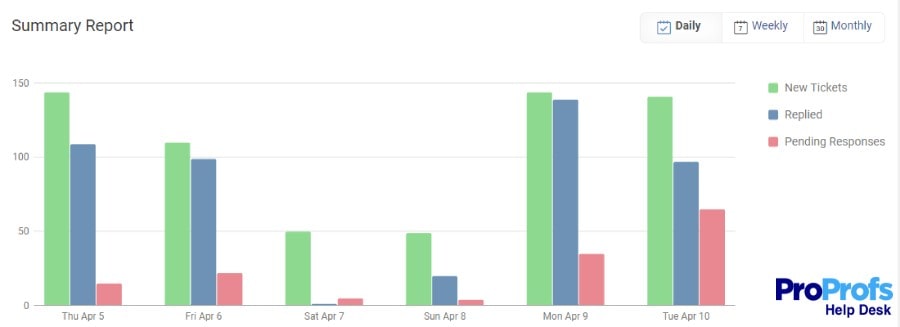If you’re still managing customer support using traditional methods, you’re probably dealing with slow response times, overwhelming ticket volumes, and frustrated customers.
As a support manager, I can tell you: help desk automation is the answer to your support woes.
Helpdesk automation can drastically improve support operations by automating repetitive tasks, routing tickets efficiently, and providing instant responses.
In this guide, I’ll walk you through everything you need to know about automating your help desk, why it’s so important, and how it can transform your team’s productivity. Let’s get started!
What Is Help Desk Automation?
Help desk automation refers to the use of software and AI-driven workflows to streamline customer support processes, reducing manual effort and improving efficiency. Instead of agents handling repetitive tasks—like ticket assignments, status updates, or basic troubleshooting—automated systems take care of them, ensuring faster resolutions and better customer experiences.
Here’s how AI enhances help desk automation:
✅ Smart Ticket Routing: AI assigns tickets based on priority, issue type, and agent availability.
✅ Customer Intent Analysis: Detects customer needs for accurate and relevant responses.
✅ Automated Response Suggestions: AI recommends replies to speed up agent responses.
✅ AI Chatbots: Handles FAQs and common queries instantly, reducing agent workload.
✅ Real-Time Analytics: Tracks patterns to improve service quality and efficiency.
I really recommend checking out this short video to see how help desk AI features can lead to better and faster automation:
Top 10 Automated Help Desk Software to Improve Response Time & Productivity
Over the past seven years, I’ve tested quite a few help desk automation tools. Now, let me share my top ten picks—along with their standout features, drawbacks, and pricing—so you can find the right fit for your needs.
Before we proceed further, let’s take a quick look at 10 top automated helpdesk tools.
Spotlight on the Top 3 Automated Help Desk Tools: A Quick Overview
Need quick recommendations? I’ve got three for you!
Option A: ProProfs Helpdesk
ProProfs Helpdesk simplifies customer support with AI features like customer intent analysis, response suggestions, automated ticket routing, and chatbots. Its detailed reporting and seamless tool integrations make managing support efficient and improve overall team performance.
Option B: HappyFox
HappyFox offers AI-powered ticket tracking and detailed real-time reports, making it ideal for data-driven decision-making. Its custom report generation provides insights into SLA compliance, team performance, and customer satisfaction, helping improve support efficiency and streamline operations.
Option B: ServiceNow
ServiceNow is a robust automated helpdesk software, ideal for IT service management. Its AI features, like Virtual Agent, automate common responses, while predictive analytics prioritize issues. Seamless integration with IT systems makes it an excellent, scalable solution for IT support automation.
1. ProProfs Helpdesk – Best for AI Help Desk & Support Ticketing for Customer Delight
I’ve been using ProProfs Helpdesk for a while now, and I have to say, it’s made customer support a whole lot easier. The AI features really stand out, especially the customer intent analysis, which instantly helps me understand exactly what the customer is looking for.
The response suggestions are another favorite of mine – they speed up replies and make my team look super efficient. Plus, automated ticket routing ensures that each query lands in the right hands, while the chatbots are great for handling basic requests even when my team’s off the clock.
One feature I can’t live without is the shared inbox. It keeps all communication in one place, making it so much easier for my team to collaborate. Plus, the reporting features give me solid insights into our performance, and the integrations with other tools are seamless. It’s all just really well thought out!
What You’ll Like:
- Shared inbox for centralized management of all support emails
- Reporting tools to get In-depth insights into ticket data, team performance, and trends
- Syncs effortlessly with your CRM, email, and chat tools for a seamless experience
- Canned responses for quick replies and reduced agent effort
What You May Not Like:
- There is no dark mode for the interface
- No downloadable or on-premise version
Pricing: FREE for a single user. Plans start at $19.99/user/month for 2 or more users.
Let’s look at how Steve Organek at Shaver Shebang used the ProProfs Help Desk to upgrade support.
Read the Full Case Study ">Watch the Video
2. Zoho Desk – Best for Omnichannel Help Desk Support
Image Source: Zoho Desk
I’ve used Zoho Desk for managing customer support, and it’s been a great tool, especially for omnichannel support. One of its most useful features is the AI assistant, Zia, which helps automate ticket categorization, suggest responses, and even predict customer sentiment.
The integration with email, chat, and social media makes it easy to manage all inquiries in one place. If you’re looking for a simple yet powerful automated helpdesk tool that works across different channels, Zoho Desk is definitely worth considering.
What You’ll Like:
- Zia AI assistant to automate ticket categorization and provides AI-based suggestions for responses
- Customizable workflows to tailor workflows to meet your team’s specific needs and processes
- Multi-brand support to manage support for multiple brands within one platform
- Time-based SLA management to tracks service level agreements and ensures timely responses
What You May Not Like:
- Some users feel customization options could be deeper in certain features
- Setting up for large teams with multiple departments can be a bit complicated
Pricing:
- Starts at $14/user/month.
3. Zendesk – Best for AI-Powered Customer Support
Image Source: Getvoip.com
I’ve used Zendesk for managing customer support, and it’s truly a comprehensive tool. I’ve found its AI features, like the Answer Bot, incredibly helpful for automating responses and resolving simple tickets quickly. The ability to manage email, chat, social media, and voice support in one platform makes Zendesk perfect for teams aiming to provide consistent, high-quality service.
With its powerful reporting tools and easy integrations, it’s an all-in-one solution that keeps customer service efficient and organized.
What You’ll Like:
- Multilingual support to handle support tickets in multiple languages with ease
- Comprehensive analytics to track team performance and customer satisfaction
- Ticket automation to automatically categorize and route tickets to the right agent
- Easy integrations with other tools and apps to enhance functionality
What You May Not Like:
- Many advanced features are locked behind higher-tier plans
- There are occasional reports of slow response times from Zendesk’s support team
Pricing:
- Starts at $55/user/month.
4. Freshdesk – Best for AI-Driven Ticket Management
Image Source: Freshdesk
I’ve used Freshdesk, and one thing I love is how much time it saves. The Freddy AI bot takes care of ticket sorting, prioritizing, and even suggesting replies, so I don’t have to do everything manually. Whether it’s emails, chats, or social media messages, everything flows into one place, making it easy to manage. I also found the automation rules super useful for cutting out repetitive tasks. Instead of constantly reassigning tickets or answering the same questions, I could focus on the bigger issues that actually needed my attention.
What You’ll Like:
- Multichannel Support to keep emails, chat, social media, and calls in one organized space
- AI-Powered ticket routing to send tickets to the right agents without manual sorting
- SLA Tracking to help keep response times in check
- Mobile App to Lets you handle tickets on the go without being stuck at your desk
What You May Not Like:
- Performance slows down when dealing with a large ticket volume.
- Custom reports could be more detailed and user-friendly.
Pricing:
- Starts at $55/user/month.
5. HelpDesk – Best for Streamlining Email-Based Support
Image Source: HelpDesk
HelpDesk is a simple yet effective automated helpdesk software that makes ticket management a breeze. I’ve used it, and what stood out was its AI-powered automated responses that help cut down response times. The smart ticket assignment ensures that queries land with the right agents, making customer support more efficient.
It also comes with collision detection, canned responses, and analytics to improve team productivity. For businesses handling a high volume of email-based support, HelpDesk provides an organized and automated way to manage customer interactions without unnecessary complexity.
What You’ll Like:
- Collision detection to prevent multiple agents from working on the same ticket
- Canned responses to save time for common issues
- Ticket tagging & categorization to organize tickets efficiently for better tracking
- Customizable workflows to automate repetitive tasks to boost efficiency
What You May Not Like:
- Some users find the automation rules restrictive
- Missing a dedicated mobile app for on-the-go ticket management
Pricing:
- Starts at $29/month.
6. HappyFox – Best for Help Desk Reporting
Image Source: HappyFox
If you’re looking for an automated helpdesk software that takes reporting to the next level, HappyFox is definitely worth checking out. I’ve personally used it, and what I love most is its ability to deliver detailed, real-time reports. The AI-powered ticket tracking is a game changer—it automatically monitors ticket progress and helps you keep an eye on agent performance.
Custom reports are super easy to generate, so I can quickly access key insights like SLA compliance, team performance, and customer satisfaction. If data-driven decision-making is a priority for your team, HappyFox offers everything you need to keep things running smoothly and improve overall support efficiency.
What You’ll Like:
- Customizable reports to track exactly what matters to your team.
- Real-time analytics to Stay up-to-date with live performance metrics and customer feedback.
- Team performance tracking to monitor how your agents are doing and identify areas for growth.
- Customer satisfaction surveys to collect feedback and easily measure customer happiness.
What You May Not Like:
- It might be out of budget for smaller businesses or teams
- Connecting to certain third-party apps can be tricky
Pricing:
- Starts at $24/agent/month.
7. Spiceworks – Best for Open-Source Ticketing System for Small IT Teams
Image Source: LiveAgent
Spiceworks is a great choice for small IT teams that need a free, open-source ticketing system without compromising on essential features. I’ve used it for managing IT support requests, and its AI-powered ticket prioritization is a huge time-saver. It automatically sorts and assigns tickets based on urgency, so my team doesn’t have to manually sift through every request.
Since it’s open-source, there’s plenty of flexibility to tweak it to fit specific IT workflows. If you’re looking for a budget-friendly, community-supported helpdesk solution, Spiceworks is a solid pick for small IT teams.
What You’ll Like:
- Real-time reporting to track IT support trends and ticket resolution times instantly
- Multi-channel support to manage IT requests from email, chat, and web portals in one place
- Collaboration tools to enable IT teams to work together on complex issues efficiently
- Asset management to keep track of IT hardware and software within the same platform
What You May Not Like:
- Some automation and advanced reporting require additional setup
- Lacks some desktop functionality for managing tickets on the go
Pricing:
- Spiceworks is free for all users.
8. Salesforce Service Cloud – Best for AI-Powered Service
Image Source: Help Desk Migration
I’ve used Salesforce Service Cloud for a while, and honestly, it’s a game-changer when it comes to AI-powered service. The AI features, especially Salesforce Einstein, have made my life so much easier. It helps predict customer needs and automates a lot of repetitive tasks like ticket routing and prioritizing, which saves a ton of time.
What really impressed me was how seamlessly it integrates with everything else in the Salesforce ecosystem. If you’re looking to level up your customer service with some serious AI power, I’d highly recommend giving this tool a try.
What You’ll Like:
- Salesforce Einstein AI to predict customer needs and automate tasks
- Automated case escalation to automatically escalate unresolved issues based on rules
- Intelligent agent assist to provide real-time suggestions to improve agent responses
- AI-Powered case classification to automatically categorize customer issues for faster resolution.
What You May Not Like:
- Pricing – It can get pricey, especially for smaller teams or startups.
- The mobile app is decent, but you’ll miss a few desktop features.
Pricing:
- Starts at $25/user/month.
9. ServiceNow – Best for IT Service Automation
Image Source: ServiceNow
I’ve used ServiceNow, and it’s an excellent automated helpdesk software, especially for IT service management. What I love is its AI capabilities, like Virtual Agent, which automates responses to common issues, allowing agents to focus on more complex tasks. The predictive analytics also help prioritize issues, ensuring that critical problems are handled first.
The platform integrates smoothly with other IT systems, making it easy to keep track of everything in one place. If you need an all-in-one solution to automate IT support, ServiceNow delivers a solid, scalable service.
What You’ll Like:
- Virtual Agent AI to Automate responses to common queries, reducing agent workload
- Unified Service Management to centralize all IT service management tasks in one platform
- Automated Incident Management to automatically route incidents to the appropriate team for faster resolution
- IT Asset Management to track and manage IT assets within the system, ensuring proper allocation
What You May Not Like:
- It can take time and expertise to fully set up and customize
- New users might find the platform overwhelming initially
Pricing:
Custom pricing.
10. SysAid – Best for IT Service Management
Image Source: A2IS
SysAid is a powerful automated helpdesk software that offers a wide array of features, making it ideal for IT service management. I’ve used it, and its ability to automate tasks and streamline workflows is impressive. One of the standout features is its AI-driven ticket routing system, which ensures that issues are quickly directed to the right team.
SysAid also offers asset management and custom reporting to help teams stay on top of their service processes. It’s an all-around tool designed to improve efficiency in managing IT operations.
What You’ll Like:
- AI-Powered ticket routing to automatically assigns tickets to the right agent
- Asset management to track and manage all your IT assets from one place
- Customizable dashboards to view relevant metrics and KPIs
- Knowledge base integration to reduce the load on support teams
What You May Not Like:
- Customizing certain features may require technical expertise.
- The mobile app doesn’t offer the full range of features available on desktop.
Pricing:
Custom pricing.
The Top Reasons Businesses Are Switching to Help Desk Automation
Customer support today isn’t just about answering tickets—it’s about speed, efficiency, and customer satisfaction. Help desk automation is helping businesses streamline operations while ensuring customers get faster resolutions. Here’s why companies are making the switch:
1. Faster Response & Resolution Times
Customers expect quick answers, and automation makes that possible. Automated ticket routing assigns issues to the right agents based on priority, category, or past interactions, reducing wait times. AI chatbots can instantly answer common queries, while automated workflows trigger follow-ups, ensuring no ticket gets lost in the queue. Faster resolutions lead to better customer retention, as no one wants to wait hours or days for a response.
Automated systems can also escalate urgent tickets instantly, making sure high-priority cases are handled without delay. Businesses can set up auto-responses to acknowledge customer concerns immediately, giving them reassurance while the issue is being resolved.
2. Reduced Manual Work for Support Teams
Repetitive tasks like sorting tickets, sending follow-up emails, or updating ticket statuses eat up valuable time. Automation eliminates these by setting up rules to handle them automatically. This frees up support agents to focus on solving complex issues, improving overall efficiency.
By removing repetitive administrative tasks, agents can dedicate more time to personalized support, enhancing customer relationships. Workflows ensure that every ticket follows a structured resolution path without requiring manual tracking.
With automation handling the background work, businesses can operate with leaner support teams without compromising service quality.
3. 24/7 Support Without Extra Costs
Customers don’t operate on a 9-to-5 schedule, and hiring round-the-clock support staff can be expensive. Help desk automation, through knowledge base and other self-service portals, ensures customers can get answers anytime. Automated ticket responses acknowledge issues immediately, setting expectations even outside business hours.
AI chatbots can handle FAQs, troubleshooting, and ticket creation, allowing businesses to maintain high service levels without additional staffing costs. Self-service portals also reduce the volume of incoming tickets by giving customers access to a knowledge base where they can find solutions on their own.
With automation in place, businesses can provide continuous support without exhausting their human resources.
4. Improved Customer Satisfaction & Experience
Long wait times and delayed responses frustrate customers. Automation helps businesses provide faster updates, proactive email notifications, and instant self-help options, leading to a smoother experience. When issues are resolved quickly and consistently, customer trust and loyalty increase. Automated helpdesk workflows ensure no ticket gets overlooked, reducing the chances of unresolved customer concerns.
AI-driven solutions help customers fix common issues without waiting for an agent, reducing dependency on human support. Plus, automated CSAT surveys play a key role in measuring customer satisfaction, offering valuable feedback on how well the support team is performing.
Check Out 10 Help Desk Response Templates to Save Time
5. Better Data & Performance Insights
Understanding customer pain points and agent performance is crucial for continuous improvement. Artificial intelligence-powered help desk systems provide analytics on rated tickets, resolution times, and response time.
Businesses can use this data to optimize their support strategies, identify recurring issues, and improve service quality. Help desk performance reports help managers track agent efficiency and workload distribution, ensuring that resources are allocated effectively.
Analyzing common support requests allows companies to refine their self-service resources, reducing ticket volume over time. Data-driven decisions ensure that support teams stay proactive, continuously enhancing service delivery based on real-time insights.
What Are the Must-Have Features of an Automated Help Desk System?
An automated desk system goes beyond basic ticket management—it streamlines workflows, improves response times, and enhances overall support efficiency. The right set of features reduces agent workload while ensuring faster resolutions. Here are the top five must-have features of an automated help desk system:
1. Canned Responses for Faster Agent Replies
Support teams often handle repetitive questions, such as password resets, troubleshooting steps, or billing inquiries. Canned responses allow agents to send pre-written, standardized answers to these common queries in just a few clicks.
Instead of typing the same response multiple times, agents can pull from a library of templated replies, significantly reducing response time and improving consistency.
These responses can also be personalized with customer-specific details, ensuring a balance between efficiency and a human touch. Over time, businesses can refine canned responses based on customer feedback to improve clarity and effectiveness.
Check Out 20 Ready-to-Use Canned Response Templates
2. Knowledge Base Integration for Self-Service
A well-integrated knowledge base empowers customers to find answers on their own without needing to contact support. Automated help desks can suggest relevant articles or FAQs based on the customer’s query, reducing ticket volume and agent workload.
A self-service portal also allows users to track ticket status and updates in real time, eliminating unnecessary follow-ups. By automating self-help options, businesses not only improve efficiency but also enhance customer satisfaction by providing instant solutions to common problems.
3. Multi-Channel Support Automation
Customers reach out for support through various channels, including email, live chat, social media, and web forms. An automated help desk centralizes all inquiries in one dashboard, ensuring that no request is missed. With automation, businesses can set up workflows to trigger responses across different channels, ensuring a seamless support experience.
Whether a customer contacts support via chat or email, automation ensures they receive the same level of service across all platforms, improving customer satisfaction and brand consistency.
4. AI Chatbots for Instant Support
AI chatbots have become an essential part of modern help desk automation. AI chatbots for the helpdesk provide real-time assistance by handling common queries, booking appointments, and even collecting necessary details before escalating a ticket to a human agent.
You can also train chatbots using knowledge base or website data to deliver accurate and personalized responses.
This significantly reduces the workload on support agents while ensuring that customers receive immediate assistance. Businesses can also customize chatbots to offer personalized responses, enhancing the overall customer experience.
5. Ticket Summarization & Response Suggestions
Ticket Summarization and Response Suggestions is a feature designed to streamline customer support workflows. It automatically analyzes incoming support tickets, summarizing the key details and suggesting appropriate responses based on the issue at hand. This helps support teams respond faster and more accurately, saving time and improving efficiency.
By offering smart response suggestions, it reduces the manual effort needed to draft replies and ensures consistent, quality support across all customer interactions, leading to a better customer experience.
How to Automate Support with ProProfs Help Desk
I’ve used ProProfs Help Desk to automate support tasks, and let me tell you—it makes life so much easier. No more manually sorting tickets or crafting the same responses over and over. If you’re looking to streamline your help desk, here are five ways to automate ProProfs Help Desk:
1. Automated Ticket Routing
ProProfs Help Desk uses Round-Robin ticket assignments to distribute them evenly among agents. This means tickets are assigned one by one in a rotating order, so no one gets overloaded. For example, if three agents are online, the first ticket goes to Agent 1, the second to Agent 2, and so on.
Once everyone gets a turn, the cycle starts again. This makes things fair and fast, ensuring every agent stays active and no ticket gets missed. It also helps reduce response time since no ticket sits waiting in a queue for too long. As a result, customers get quicker replies, and agents work more efficiently.
2. AI-Generated Responses for Common Questions
No one wants to spend hours answering the same questions repeatedly. That’s where AI-generated responses come in handy. ProProfs Help Desk uses AI to generate smart, contextual replies.
Unlike basic canned responses, these AI-powered replies feel more natural and relevant, helping customers get the information they need without having to wait for an agent. This feature not only improves response times but also ensures consistency in answers, reducing the risk of miscommunication.
3. AI Chatbots for Instant Customer Assistance

AI chatbots are crucial when it comes to providing quick support, especially outside business hours. With ProProfs Help Desk, you can set up AI-driven chatbots that engage with customers in real-time.
These bots can answer frequently asked questions, guide users to the right help articles, and even collect necessary details before handing the conversation over to a live agent.
This means customers don’t have to wait in a queue for simple inquiries, and agents can focus on resolving more complex issues. It’s a win-win for both sides.
4. Automatic Ticket Escalations
Sometimes, tickets require urgent attention, but if they get stuck in a backlog, it can lead to frustrated customers. ProProfs Help Desk prevents this by automatically escalating unresolved tickets. If a ticket remains unanswered beyond a set time limit, the system flags it and forwards it to a higher-level agent or manager.
This ensures that high-priority issues aren’t left waiting too long and that customers receive timely responses. This kind of automation helps businesses maintain high service standards and improve customer satisfaction.
5. Automated Reports & Performance Insights
Tracking help desk performance manually can be overwhelming, but ProProfs Help Desk makes it easy with automated reports and analytics. The system continuously monitors key metrics like rated tickets, average resolution time, and customer satisfaction ratings.
These reports are generated automatically, so managers can quickly identify trends, spot inefficiencies, and make data-driven decisions without having to dig through raw data. Plus, with the report scheduling feature, you get regular performance updates sent straight to your inbox.
Selecting the Best Help Desk Automation Tool: Key Factors to Consider
With so many help desk automation tools out there, I know how overwhelming it can be to find the right one. The best solution should cut down on manual tasks, improve customer support, and make life easier for your team. Based on my experience, here are the key factors to consider when choosing the best help desk automation tool for your business.
1. AI-Powered Automation Capabilities
Look for a tool that offers AI-driven ticket routing, automated responses, and intelligent chatbots. These features reduce manual intervention, ensuring that customer inquiries are handled efficiently without delays. A system with machine learning capabilities can also improve over time by analyzing past interactions and optimizing workflows.
AI-powered tools can detect sentiment in customer queries and prioritize urgent requests. This ensures that high-priority issues are resolved faster without getting buried under routine tickets.
2. Multi-Channel Support
Customers reach out through different platforms—email, live chat, social media, and phone. A good help desk automation tool should centralize all these channels into a single dashboard, allowing your team to manage tickets seamlessly. Integration with popular communication tools ensures that no query is missed.
With multi-channel automation, businesses can maintain a consistent customer experience across different touchpoints. This also reduces the need for agents to switch between multiple platforms, saving time and effort.
3. Self-Service & Knowledge Base Integration
A well-automated help desk should empower customers to find solutions on their own. Choose a tool that supports a knowledge base, FAQs, and AI-driven article recommendations. This reduces ticket volume and lets customers get answers instantly without waiting for an agent.
A robust self-service portal can include guided troubleshooting, enabling customers to resolve complex issues step by step. Reducing dependency on live support also frees up agents to focus on high-priority or technical issues that require human intervention.
Take a Look at 100+ Ready-to-Use Knowledge Base Templates for Easy Setup
4. Reporting & Analytics

Data-driven decision-making is crucial for improving customer support. Look for a help desk automation tool that offers detailed performance analytics, including resolution times, agent efficiency, and customer satisfaction scores. Automated reporting helps track trends and optimize service quality.
Real-time dashboards give managers insights into support performance, enabling quick adjustments to improve service. Historical data analysis can also reveal recurring customer issues, helping businesses proactively address common pain points.
5. Integration with Existing Tools
Your help desk software should seamlessly integrate with your CRM, email, and other business tools. This ensures that customer interactions are tracked across platforms, providing a unified experience. Look for API support and pre-built integrations with major business applications.
Integration with a CRM helps agents access customer history instantly, enabling personalized support. A well-integrated help desk reduces data silos, ensuring that all customer interactions are documented in a single system.
How Will AI Shape the Future of Help Desks?
AI is already making waves in various industries, and help desks are no exception. As technology evolves, AI will continue to play a pivotal role in transforming how customer support operates. Here’s how AI will shape the future of help desks:
1. Enhanced Customer Support with AI Chatbots
AI-powered chatbots are already handling customer queries in real-time, providing instant responses to frequently asked questions. These chatbots will become even more sophisticated, using natural language processing (NLP) to understand complex issues and offer personalized solutions. This means customers can get the help they need at any time of day, without waiting for a human agent, which significantly improves response times and customer satisfaction.
2. Smarter Ticket Routing and Prioritization
AI will further enhance ticket routing by automatically analyzing and categorizing incoming tickets based on their content, urgency, and complexity. This allows help desks to route tickets to the appropriate agent with the right skill set more efficiently.
AI can also prioritize high-priority issues, ensuring that urgent problems get immediate attention, reducing resolution times, and increasing overall productivity.
3. Automating Repetitive Tasks
Help desk agents spend a significant amount of time handling repetitive tasks, such as ticket assignment, follow-ups, and data entry. AI will automate these mundane activities, allowing agents to focus on more complex and valuable customer interactions. Automation will also reduce human error and ensure that the processes are consistently executed, increasing efficiency and reliability across the board.
4. Data-Driven Insights for Better Decision-Making
AI will provide valuable analytics by tracking and analyzing customer interactions, identifying patterns, and generating insights about common issues, customer satisfaction, and agent performance. With this data, businesses can make informed decisions about improving customer service, optimizing workflows, and identifying opportunities for training or product improvements. AI-powered analytics will help businesses stay ahead of customer expectations and improve their support strategies over time.
5. Proactive Customer Support
AI’s ability to analyze customer data and predict issues will take customer support to the next level. Rather than simply reacting to problems, AI can proactively identify potential issues before they escalate. For instance, if the system detects a problem that could affect multiple customers, it could automatically send out notifications or solutions to prevent a surge in support tickets. This proactive approach can lead to better customer experiences and fewer support requests overall.
Boost Efficiency with Help Desk Automation: Here’s How to Start
Help desk automation plays a crucial role in improving the efficiency and effectiveness of customer support teams. By automating tasks like ticket routing, responses, and follow-ups, businesses can reduce response times and ensure consistent service.
To make the most of automation, focus on customizing it to your processes, integrating it with other tools, and continuously tracking performance. When selecting automation software, ensure it’s scalable, supports multiple channels, and offers AI-driven features.
ProProfs Help Desk provides features such as response suggestions, and automated ticket routing, helping you streamline your support operations and deliver exceptional service to your customers. Explore ProProfs Help Desk today!
Help Desk Automation: FAQs
Which areas of a Help Desk can be automated?
Areas like ticket creation, routing, follow-ups, canned responses, knowledge base suggestions, and reporting can all be automated to improve efficiency and response times.
Can you use help desk automation tools for a service desk?
Yes, many help desk automation tools can be used for a service desk, as both aim to streamline workflows. However, service desk tools typically focus more on IT service management and incident handling.
What is the impact of service desk automation?
Service desk automation speeds up issue resolution, reduces manual tasks, improves consistency, and enables proactive support, all while cutting operational costs.
Is Service Desk automation and help desk automation the same?
No, they’re not the same. Help desk automation focuses on customer support, while service desk automation handles IT service management tasks, including incidents and change requests.






